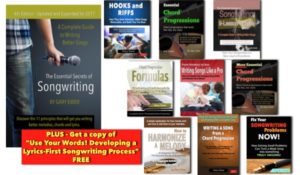When we talk about an instinct, we’re usually referring to something that’s born within us, something for which we have an obvious talent or aptitude. In common usage, we usually take the term even further and say that an instinct is something that we do without thinking. (“A bird flew toward my car as I was driving, and I instinctively ducked my head!”)
In songwriting, we might refer to one’s ability to write consistently good music as the result of good musical instincts. And in fact, we usually use the word instinct in a positive sense.
 If creating hooks for your songs is something you’ve always found hard, read “Hooks and Riffs: How They Grab Attention, Make Songs Memorable, and Build Your Fan Base”. Buy it individually, or get it as part of the 10-eBook Bundle.
If creating hooks for your songs is something you’ve always found hard, read “Hooks and Riffs: How They Grab Attention, Make Songs Memorable, and Build Your Fan Base”. Buy it individually, or get it as part of the 10-eBook Bundle.
But it’s worth wondering: is it ever possible to have bad songwriting instincts? What would those look like?
If we define an instinct as something we do automatically without thinking about it, then there are probably many things that might fit into that category:
- As we improvise melodies, our fingers keep moving to familiar note patterns.
- As we improvise chords, we keep relying on the same chord choices, backed by the same old strumming rhythm we’ve relied on for other songs.
- As we improvise lyrics, we find ourselves using phrases and sentence constructs that we’ve used before.
In a way, these kinds of instincts come about through the musical version of “muscle memory.” That term, muscle memory, also refers to things that we do automatically, without thinking.
Inasmuch as we might refer to musical muscle memory as “bad instincts”, what can you do to keep your music fresh and ensure that you aren’t unthinkingly relying on old ideas in the attempt to create new ones?
Here are 6 tips to be sure that the only instincts you deal with as a songwriter are good ones:
- Develop several songwriting processes and use them interchangeably. Don’t start consecutive songs using the same chords-first process, for example.
- Change the mode (major/minor) of your song if it sounds uncomfortably familiar. If you find yourself working out a new song with a chord progression that sounds too much like a previous one (C F Dm G C), switch to the opposite mode (Cm Fm Ddim G (or Gm) Cm).
- Develop a repertoire of new and inspiring strumming patterns. If you constantly resort to the one or two familiar patterns that have been your favourites, even different progressions start to sound the same. It’s time to branch out!
- Work out rewordings of familiar lyrical phrases. Take lines of lyric that sound trite, overused or cliché, and see how many ways you can rewrite the same line.
- Experiment with tempo. Taking a slow song up-tempo, or slowing down something that originally came to you as a fast song, is a great way to create a new mood or feel. This is particularly useful if all you rely on the same tempo for most of your songs.
- Find new things to write about. Love songs still sell, of course, but you may need to start looking further afield for ideas if everything you sing about is your latest relationship. Dig deeper and try to identify the things that occupy your thoughts in the run of an average day. You may be surprised that some of those thoughts might serve as good ideas for song topics.
 Written by Gary Ewer. Follow Gary on Twitter.
Written by Gary Ewer. Follow Gary on Twitter.
“The Essential Secrets of Songwriting 10-eBook Bundle” comes with a Study Guide! Also comes with an 11th FREE ebook: “Use Your Words! Developing a Lyrics-First Songwriting Process”











